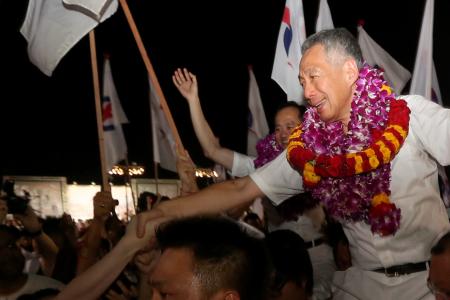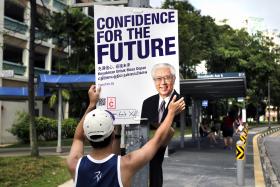Voters opt for 'tried and tested'
Opposition fails to make inroads in Parliament despite buzz over the past two weeks
Online vitriol against the People’s Action Party (PAP), social media interest in opposition candidates, bookies’ odds and attendance at rallies were obviously no barometers of the popular vote.
In an election where a record 2.3 million people were expected to give the opposition further inroads into Parliament — with de facto opposition leader and Workers’ Party (WP) chief Low Thia Khiang calling for 20 opposition MPs to create a strong team to check the PAP — it turned, in stunning fashion, in the other direction.
By 9.30pm, with the release of the sample votes, it was all over, with the PAP winning 83 out of the 89 seats available.
“I think like many Singaporeans and many analysts, we were surprised. There is a big gap between expectations and reality,” said political watcher Dr Eugene Tan, law professor with the Singapore Management University (SMU).
The PAP’s popular vote leapt to 69.86 per cent, a huge gain from the 2011 tally of 60.1 per cent and a performance even Prime Minister Lee Hsien Loong said “exceeded expectations”.
In one of many massive wins for the PAP across the island, Jurong GRC led by Deputy Prime Minister Tharman Shanmugaratnam returned with a thumping 79.28 per cent of the valid vote.
Instead of gaining ground, the WP lost its seat in Punggol East, and barely held on to Aljunied GRC and Hougang SMC. This, despite fielding what they called “very strong candidates”, many of whom were industry leaders with master’s degrees and doctorates to their names.
PAP WINS BIG
Supposedly close fights in Marine Parade and East Coast GRCs turned out to be cakewalks, with the PAP garnering relatively handsome majorities of 64.07 per cent and 60.73 per cent of the valid votes respectively.
The PAP gamble of putting first-time candidate and 10-year grassroots veteran Cheryl Chan worked in Fengshan SMC, as she pipped the much fancied WP candidate Dennis Tan with 57.52 per cent of the valid vote.

Institute of Policy Studies senior research fellow Gillian Koh noted that Ms Chan had “taken a page out of the WP playbook” and had worked the ground for many years.
When asked about the massive swing, SMU’s Dr Eugene Tan said that a more discerning set of voters, who found the opposition’s manifestos and policies unsustainable, worked in the PAP’s favour.
He added that “in many ways they (PAP) pulled out all stops to address the widespread voter unhappiness arising from May 2011”.
“The second factor that may have helped the PAP very significantly is this pervasive sense of foreboding that the PAP might come out poorly. I wouldn’t say there was a concern about a freak election outcome but I think there was a concern that the PAP was threatened and given the level of uncertainty, regional uncertainty, I think there was this flight to safety, and voters feeling that it would be better to go with the tried-and-tested brand.”
BODY BLOW FOR WP
While there were scenes of jubilation across the three PAP assembly centres, at Hougang Stadium where the WP supporters had gathered, the mood grew progressively sombre as the night wore on.
Besides losing Punggol East, they also suffered percentage point declines across wards contested.
In Punggol East, PAP’s Charles Chong, 62, a veteran politician who was initially rumoured to be retiring, won by 51.76 per cent of the valid vote against WP’s Lee Li Lian.
Mr Chong has been a trump card for the PAP: In 2011, he was moved from Pasir Ris-Punggol to save the shaky Joo Chiat SMC and also won by 51 per cent.
In Aljunied, the margin against a PAP team of newbies was so small that a recount had to be called. Previously described as a “major step” for the opposition when they won it in 2011, WP’s star team could only manage 50.95 per cent of the valid vote, narrowly beating their opponents by 2,612 votes.
In Hougang, WP’s stronghold, its candidate, Mr Png Eng Huat, only garnered 57.69 per cent of the valid vote, down from 62.08 per cent in the 2012 by-election.
National University of Singapore sociologist Tan Ern Ser said that aside from the Lee Kuan Yew factor and SG50 bonhomie, the WP’s reputation was dented by the Aljunied-Hougang-
Punggol East Town Council saga, where questions were raised over the party’s handling of the town council’s accounts.
WP chief Low Thia Khiang said they fared “pretty well”, in the face of the “massive” national swing, to retain their Hougang and Aljunied seats.
DEADLY 3-WAY FIGHTS
The other opposition parties fared worse, with significant vote swings against them.
Singapore People’s Party’s Lina Chiam suffered a 16.05 percentage point swing against her while the National Solidarity Party (NSP) team in Tampines lost 14.84 percentage points.
Then, despite garnering immense interest on social media, plenty of positive comments online, and apparently outshining all politicians on Facebook, Singapore Democratic Party’s (SDP) chief Chee Soon Juan received just 33.38 per cent of the valid vote in Holland-Bukit Timah GRC.
In 2011, the SDP team — which had to do without the then-bankrupt Dr Chee — did better, scoring 39.92 per cent.
The three-way fights also proved deadly for the opposition and independents involved.
It was a bloodbath for independent candidate for Bukit Batok SMC, Mr Samir Salim Negi, who only got 150 votes or 0.6 per cent and NSP’s candidate for MacPherson SMC Cheo Chai Chen got a mere 0.82 per cent, or 215 votes.
Independent for Radin Mas SMC, Ms Han Hui Hui, managed 2,629 votes, but at 10.04 per cent of the valid vote, also lost her election deposit. She was spotted leaving the Radin Mas Primary School counting centre while lying in the back seat of a car.
Dr Eugene Tan said: “Within the non-WP opposition, I think it raises serious questions about how electable some of their party leaders are. I think in the WP, there will be a lot of questions about whether there should be new ideas.
“Certainly for the non-WP opposition, I think the leaders should consider whether they should make way for younger leaders, given that they have not made much inroads despite the electorate being more receptive to opposition.”
Opposition party leaders who spoke to the media last night mostly acknowledged the vote swing, and called it “unexpected”.
But Reform Party chief Kenneth Jeyaretnam was far more sore at losing.
He said: “As far as I am concerned, this is not a mandate for PAP’s economic polices... all this is, is a mandate for authoritarianism and brain washing.
“All I see is similar margins in North Korea and China.”
He ended by saying: “I guess Singaporeans get the Government they deserve. I don’t want to hear any more complaints.”
Get The New Paper on your phone with the free TNP app. Download from the Apple App Store or Google Play Store now


